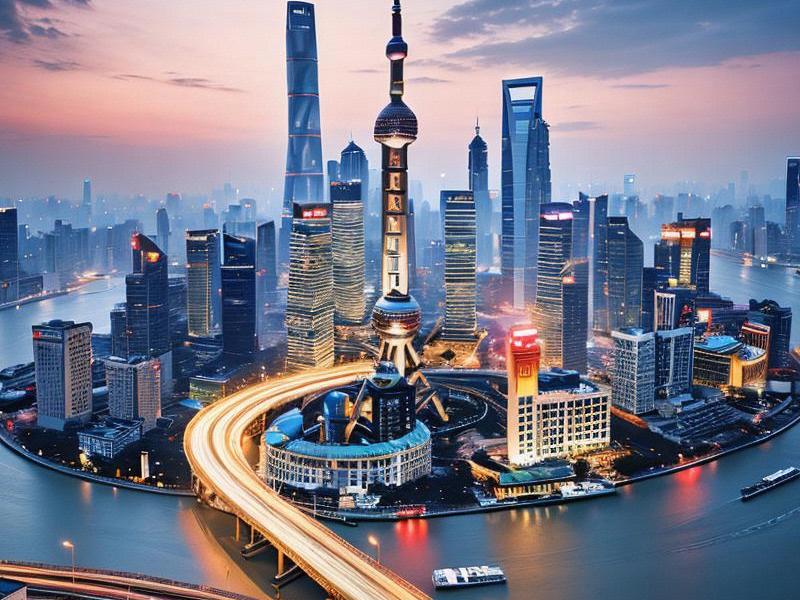
Shanghai, often referred to as the "Pearl of the Orient," is a city that seamlessly blends the old with the new. Its skyline, dominated by the iconic Oriental Pearl Tower and the futuristic Shanghai Tower, is a testament to its rapid urban development. Over the past few decades, Shanghai has transformed from a fishing village into a global metropolis, becoming a key player in China's economic rise.
The city's strategic location at the mouth of the Yangtze River has made it a natural hub for trade and commerce. Shanghai's port is one of the busiest in the world, handling millions of containers annually. This maritime prowess has been instrumental in Shanghai's economic success, attracting multinational corporations and fostering a thriving business environment.
Shanghai's Pudong district is a prime example of the city's urban transformation. Once a rural area, Pudong has been transformed into a modern financial district, home to the Shanghai Stock Exchange and the headquarters of numerous multinational companies. The Lujiazui financial district, with its stunning skyline, is a symbol of Shanghai's economic might.
Culturally, Shanghai is a melting pot of influences. The city's history as a former foreign concession has left a lasting impact on its architecture, cuisine, and lifestyle. The Bund, a historic waterfront area, showcases a blend of colonial-era buildings and modern skyscrapers, offering a glimpse into the city's rich history. The French Concession, with its tree-lined streets and charming cafes, remains a popular spot for both locals and tourists.
上海龙凤419油压论坛 Shanghai's culinary scene is renowned for its fusion of traditional Chinese flavors and international cuisines. From the famous xiaolongbao (soup dumplings) to the Michelin-starred restaurants, the city offers a diverse range of dining experiences. The vibrant night markets and bustling food streets provide an authentic taste of local life, with vendors serving everything from street food to gourmet delicacies.
The city's cultural institutions, such as the Shanghai Museum and the Shanghai Grand Theatre, play a crucial role in preserving and promoting the arts. The Shanghai Museum, known for its extensive collection of Chinese art, attracts millions of visitors each year. The Shanghai Grand Theatre, a state-of-the-art venue, hosts a wide range of performances, from classical music to contemporary theater.
Shanghai's commitment to innovation is evident in its thriving technology sector. The city has become a hub for startups and tech companies, attracting talent from around the world. The Zhangjiang Hi-Tech Park, often referred to as "China's Silicon Valley," is home to numerous high-tech enterprises and research institutions. This focus on innovation has positioned Shanghai as a leader in fields such as artificial intelligence, biotechnology, and green energy.
The city's government has also taken significant steps to promote sustainable development. Initiatives such as the construction of green buildings, the expansion of public transportation, and the promotion of renewable energy sources demonstrate Shanghai's commitment to environmental sustainability. The Bund Riverwalk, a pedestrian-friendly promenade, offers a scenic route along the Huangpu River, highlighting the city's efforts to balance urban development with environmental conservation.
上海娱乐 Shanghai's global influence extends beyond its economic and cultural achievements. The city has played a pivotal role in China's integration into the global economy, serving as a bridge between East and West. Its international airports and seaports facilitate trade and tourism, connecting Shanghai to cities around the world.
The city's leadership in international organizations, such as the World Expo and the Asian Infrastructure Investment Bank, further underscores its global significance. The 2010 World Expo, held in Shanghai, was a landmark event that showcased the city's ability to host large-scale international events and foster global cooperation.
Shanghai's educational institutions are also contributing to its global reputation. Renowned universities such as Fudan University and Tongji University attract students and researchers from around the world, fostering academic exchange and innovation. These institutions play a crucial role in shaping the city's future, providing a steady stream of talent and expertise.
上海品茶网 The city's vibrant arts scene reflects its cultural diversity and creativity. The Shanghai International Film Festival, one of the oldest and most prestigious film festivals in Asia, attracts filmmakers and audiences from around the globe. The city's art galleries and theaters showcase a wide range of artistic expressions, from traditional Chinese art to contemporary installations.
Shanghai's resilience and adaptability have been tested by various challenges, including economic fluctuations and global crises. However, the city has consistently demonstrated its ability to recover and thrive. Its dynamic spirit and innovative mindset have enabled Shanghai to navigate complex challenges and emerge stronger.
The future of Shanghai looks promising, with ongoing efforts to enhance its infrastructure, promote sustainable development, and foster innovation. The city's vision for the future includes the construction of smart cities, the expansion of green spaces, and the continued growth of its technology sector. These initiatives aim to ensure that Shanghai remains a global leader in the 21st century.
In conclusion, Shanghai is a city that embodies the spirit of progress and innovation. Its rapid urban development, rich cultural heritage, and commitment to sustainability make it a unique and dynamic metropolis. As Shanghai continues to evolve, it remains a beacon of hope and opportunity, inspiring people from around the world with its vision for the future.
